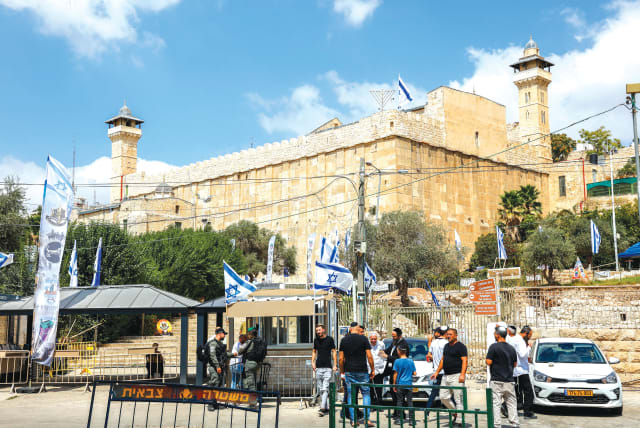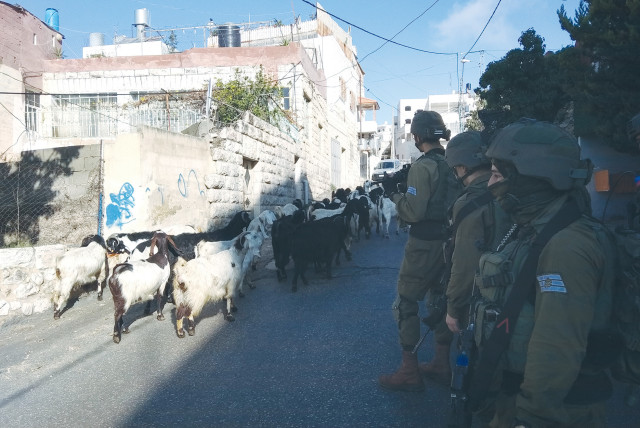There’s no such thing as ‘the’ settlements - opinion

Most new and renewed Jewish communities are neither “illegal” nor “colonial,” considering the Jewish connection to the land.
Take one: two terrorists invade a Hummus Eliyahu, a popular eatery, firing wildly. Just 10 minutes earlier, a class of “Mechinists,” gap-year students, had been eating there happily.
They left in time and remain alive, miraculously. Before a member of a local civilian security patrol appeared and bravely shot back, killing one terrorist while sustaining two bullet wounds, the murderers killed four people: Elisha Antman, 17, Harel Masoud, 21, Ofer Fairman, 60, and Nachman Shmuel Mordoff, 17.
Palestinian terrorists have now killed 28 innocents in 2023. Soldiers tracked the second killer, who soon died in a firefight.
Take two: two Palestinian freedom fighters heroically attacked settlers outside Eli, an extreme, right-wing, religious settlement. They killed four religious right-wing settlers. The murderous Occupation Forces made both shahids, martyrs.
Take three: Last Tuesday, six people died in the ongoing cycle of Middle East violence.
The three “takes” describe the same incident, offering clashing interpretations. I am so proud that, from Eli to Tel Aviv, most Israelis, despite our polarization, don’t view such crimes through a sectorial lens.
Why terrorism persists
Looking at the heartbreaking photos of these victims, we see ourselves, our kids, and our friends. We don’t define them by the length of their sidelocks, the size or absence of their kippot, or their home addresses.
Unfortunately, the terrorists feel emboldened by those who revere them and by the slobs who equate terrorists and their victims.
Terrorism is a crime of political exhibitionism. Preying on innocents living their lives, terrorists try to spread fear among civilians, while making a broader political point. Israelis and visitors to Israel fight terrorism best by not letting terrorists disrupt their plans, their routines; the world should assist by condemning these butchers unequivocally.
Alas, while the constant, low-level onslaught desensitizes even many of Israel’s friends, the “s-word,” “settlements,” muddies the world’s perspective. We keep hearing that “the” settlements are “illegal.” Such language suggests that rather than being in the wrong place at the wrong time, the four victims were wrong for being in that place at all.
The word “the” implies a monolithic simplicity in this complicated world. Rather than treating “the” settlements as all alike, consider three different Israeli villages or communities – softer words that don’t conjure up images of illegal armed camps on Palestinian lands, filled with gun-toting, kippah-wearing, Brooklyn-accented fanatics trash-talking the Palestinians on CNN.
IN 1943, idealistic pioneers established Kfar Etzion, 25 kilometers from the Holy City of Jerusalem, on land purchased from local landowners. They built a thriving kibbutz that also defended access to the Jews’ forever capital for 3,000 years since King David. In 1948, on the eve of Israel’s independence, Arabs overran the village. As many as 127 were massacred, some after surrendering.
For nineteen years, the survivors of that siege – and the orphaned children – would stand on a Jerusalem hilltop, straining to catch a glimpse of a towering, lonely, etz alon, a 700-year-old oak tree, which symbolized their loss, their longing – and ours.
In June 1967, after three Arab armies attacked, Israel legitimately won back that territory. That September, survivors, orphans, and others returned to Kfar Etzion and some neighboring villages. Today 1,278 people live in this thriving community.
Given Kfar Etzion’s roots – and proximity to Jerusalem – most peace proposals include it in redrawn maps of Israel. Its situation is far less complicated than the second community, Hebron.
Empathy for both sides
Hebron’s Jewish roots stretch back even longer – to the Bible itself. Its ideological and existential importance is even greater – considering the Cave of the Patriarchs there, and the bloody history of 1929, when Arab rioters killed, raped, and brutalized their longtime neighbors, disrupting the continuous Jewish story there.
But today, Hebron’s Jewish community of 700 sits in the heart of a Palestinian city of 200,000. Anyone who visits Hebron and doesn’t see the ongoing Jewish presence there, architecturally and historically, has no eyes. But anyone who cannot feel the pain and frustration of Palestinians there has no heart.
Finally, consider Homesh, one of many outposts built on private Palestinian land, thus violating Israeli law – even under Benjamin Netanyahu’s government.
Under any possible peace plan, no Jew – in fact, no fair person – should question the Jewish rights to any inch of the Promised Land. Doing that negates 3,000 years of Jewish history while rejecting the Christian narrative which implicitly acknowledges this Promised Land’s Jewishness.
Similarly, most new and renewed Jewish communities are neither “illegal” nor “colonial,” considering the Jewish connection to the land, Jordan’s illegitimate occupation from 1949 to 1967, and the Jews’ return in 1967, not as imperialist conquerors but as desperate defenders.
In fact, prime minister Levi Eshkol urged Jordan’s King Hussein not to attack Israel, which was already enmeshed in a two-front war with Egypt and Syria. Consider how many Americans – and other good people worldwide – live on land seized through some armed conflict with neighbors.
This analysis is not about Left or Right, staying or withdrawing from land – as Israel has done before, hoping for peace. It’s simply about historical rights. It rejects the notion that the land is exclusively Palestinian or that Israelis’ return to those historic, romantic landscapes is illegal and illegitimate.
Most important, it repudiates the stance that anyone – often bullied or manipulated by others – has the right to enter a restaurant and fire away, knowing that too many people will applaud them, while others will validate their actions, through sloppy comparisons, ignorance, an addiction to the “the” word – or simply through their silence.
The writer is an American presidential historian and, most recently, the editor of the three-volume set Theodor Herzl: Zionist Writings, the inaugural publication of The Library of the Jewish People.
Jerusalem Post Store
`; document.getElementById("linkPremium").innerHTML = cont; var divWithLink = document.getElementById("premium-link"); if (divWithLink !== null && divWithLink !== 'undefined') { divWithLink.style.border = "solid 1px #cb0f3e"; divWithLink.style.textAlign = "center"; divWithLink.style.marginBottom = "15px"; divWithLink.style.marginTop = "15px"; divWithLink.style.width = "100%"; divWithLink.style.backgroundColor = "#122952"; divWithLink.style.color = "#ffffff"; divWithLink.style.lineHeight = "1.5"; } } (function (v, i) { });

